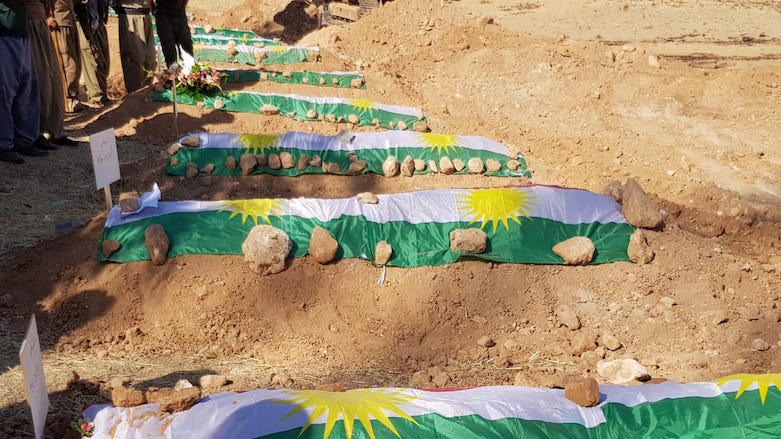Kurdish official: US should protect Iran’s Kurds from missile attacks

(Kurdistan 24) - Spokesperson for the Kurdistan Democratic Party – Iran (KDP-I), Dr. Asso Hassan Zadeh, told Kurdistan 24 on Sunday that time was of the essence for the US to protect Iranian Kurds from missile attacks, just as the US has promised to support the United Arab Emirates (UAE) and Saudi Arabia against similar attacks.
On Sep. 8, Iranian rockets targeted the headquarters of two Iranian Kurdish opposition groups, the KDP-I and the Democratic Party of Iranian Kurdistan (PDKI) in Koya, where at least 17 were killed.
On Friday, US Secretary of State Mike Pompeo on the Hugh Hewitt Show said that the US would help the UAE and Saudi Arabia against similar Iranian missile attacks in the future.
“Those missiles and the hardware and software that supports them are coming from the Islamic Republic of Iran. We see it in the hardware, we can tell by the telemetry, and we know by the fact that we have had interdictions at sea which make very clear the source of this,” Secretary Pompeo said.
“So what you have is a proxy war being engaged in by Iran against Saudi Arabia and the Emirates. It’s something that we’ve made clear what we are going to do our level best to prevent, and we are supporting the Emirates and Saudi Arabia in their efforts to take down these missiles,” he added.
The KDP-I’s spokesman, Zadeh, stated to Kurdistan 24 that in the case of the Koya attack, it was clear that Iran was responsible, “since the Islamic Republic immediately claimed responsibility for this criminal aggression.”
The official said he welcomed the decision by Washington to protect US allies in the region, but added that the Kurds should also be seen as American assets.
“For my part, I do not see any difference between Saudi Arabia and Iraq or Iraqi Kurdistan where we find ourselves and where we are continually threatened by Iranian attacks. Iraq and Iraqi Kurdistan are even far more important from the point of view of the conflict between Iran and the United States,” he argued.
“The real theater of rivalry between the United States and Iran is Iraq, including Iraqi Kurdistan. The United States has spent huge sums of money and lost many soldiers in the liberation and stabilization of Iraq. American interests are still very present in Iraq and Iraqi Kurdistan.”
Zadeh said that Iran has already threatened new missile attacks against the Iranian Kurds.
“One of the Iranian justifications for the missile attack on our headquarters was to say that the Americans support us in our activities against Iran. Just a few days ago, Iran again threatened to launch new missiles on our headquarters if we rebuilt our base. It is essential that the Americans take a comprehensive approach to Iran’s destabilizing maneuvers in the region,” he affirmed.
“The United States is the only power with the military and technological capability to intercept and destroy Iranian missiles launched in the area against us in the future. In the same way as they did in 1991 for the Iraqi Kurds, we are entitled to request an air defense zone in the face of the danger of Iranian bombing,” Zadeh explained, referencing the no-fly zone over the Kurdistan Region during the first Gulf War.
“It is urgent, from a humanitarian point of view, because the lives of our members and our families in Iraqi Kurdistan are in danger,” he added.
Zadeh continued to explain that Iran is not at war only against the Iranian Kurds. “What Iran is seeking to hit first and finally is the American interests and presence in Iraq and the region,” he said.
According to Alberto Fernandez, a former US ambassador, the Iranian Kurds can still benefit from the current US policy.
“What the policy should do is curb Iranian ambition, right? That is what it is intended to do, so you would think that there is this kind of logical process: either the regime weakens, or the regime changes its behavior, which could help a lot of people,” he told Kurdistan 24.
“Secretary Pompeo talked about human rights in Iran (…). So it’s not just about Iranian ambitions in Syria, Yemen, Lebanon, and the Gulf, it is also about Iran’s behavior inside Iran That would affect the Kurds because there are human rights issues [executions, etc.],” he noted.
From March through September, Iran has hanged over 40 Iranian Kurds and sentenced just under a dozen other activists to death, as reported by Hengaw, a group that writes on human rights violations involving Kurds in Iran.
Other cases that garnered international attention in recent weeks were that of Ramin Hussein Panahi and two cousins Loghman and Zaniar Moradi who were all executed on Sep. 08.